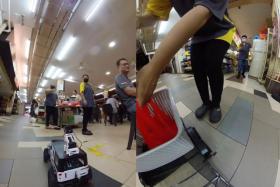Lab-grown meat getting boost from Government
It is clean, has a low carbon footprint and does not involve any killing.
Lab-grown meat is a key protein alternative of the future and could be making its way to dinner plates here, as Singapore ramps up production of home-grown food.
The effort is getting a boost from the Government's Research, Innovation and Enterprise 2020 plan, under which $144 million is going into food-related research, including sustainable urban food production, future foods and food safety science and innovation.
To make meat, stem cells extracted from chickens, cows, fish and pigs will be grown and multiplied in bioreactors, and eventually undergo tissue engineering to make whole meat cuts, said researchers.
Leveraging on its existing technology in bioproduction and stem cell bioengineering, A*Star's (the Agency for Science, Technology and Research) Bioprocessing Technology Institute (BTI) has started trials on culturing meat, which will be grown on a large scale in bioreactors.
The cells will make up at most half of the meat with the rest made up of bulking agents such as starch and other ingredients to improve taste and texture.
NUTRITION
But its nutritional value will be similar to that of traditional meat, said Dr Kelvin Ng, head of strategic innovation at BTI.
Scientists here are not just growing meat in labs.
They are also breeding tough, fast-growing superfish that have extra amounts of healthy fat in efforts to produce more high-quality protein.
The "premium tilapia" are also disease-resistant and rich in omega-3 fatty acids, and are being bred in Temasek Life Sciences Laboratory (TLL).
The tilapia will join the ranks of locally produced fish stock - TLL-bred sea bass and barramundi, developed by Barramundi Asia.
Last year, only 9 per cent of the fish eaten in Singapore was produced locally.
"Tilapia is a traditional brackish-water or freshwater fish. In Singapore, we don't have much freshwater sources.
"But we have a lot of coastal lines, so we are working on adapting our Tilapia to grow in seawater," said Dr Liew Woei Chang, research investigator at TLL.
Meanwhile, National University of Singapore (NUS) scientists are creating the next generation of supercrops that can survive drought and withstand high temperatures.
They will also be disease-resistant and grow well in low light intensity. To develop these traits in crops, their genes must be enhanced.
Scientists here have invented a novel nanotube carrier that can be absorbed by the leaf to transform the genes in a cell component at a faster rate.
The nanotube carrier was developed by scientists at the Singapore-MIT Alliance for Research and Technology at the Campus for Research Excellence And Technological Enterprise in NUS.
Since 2017, a research team in TLL has also been carrying out a vegetable breeding programme in its quest to produce batches of crops that grow optimally in indoor farming conditions such as low light intensity.
FOR MORE, READ THE STRAITS TIMES TODAY
Get The New Paper on your phone with the free TNP app. Download from the Apple App Store or Google Play Store now


